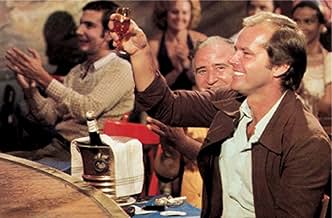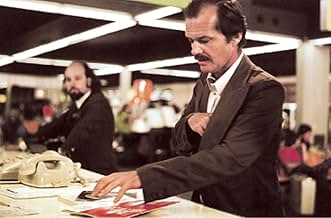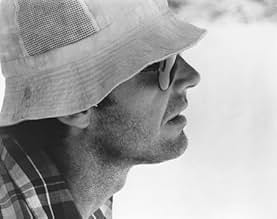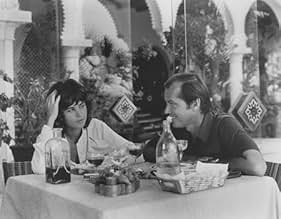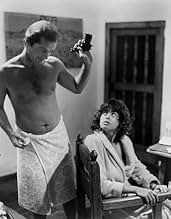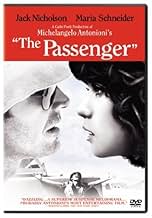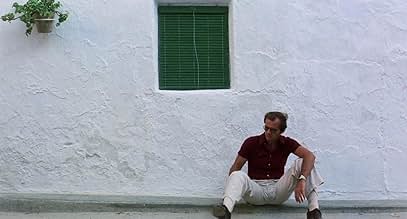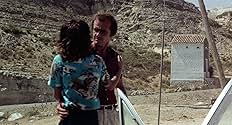Unable to find the war he has been asked to cover, a frustrated war correspondent takes the risky path of co-opting the identity of a dead arms-deal acquaintance.Unable to find the war he has been asked to cover, a frustrated war correspondent takes the risky path of co-opting the identity of a dead arms-deal acquaintance.Unable to find the war he has been asked to cover, a frustrated war correspondent takes the risky path of co-opting the identity of a dead arms-deal acquaintance.
- Awards
- 5 wins & 2 nominations total
- Robertson
- (as Chuck Mulvehill)
- Hotel Clerk
- (uncredited)
- Murderer's accomplice
- (uncredited)
- Cameraman
- (uncredited)
Featured reviews
Thirty years later, Michelangelo Antonioni's re-released "The Passenger" is looking very good, and so are Jack Nicholson and Maria Schneider, as the journalist who takes a dead man's identity in the Sahara and the girl he meets in Barcelona who decides to tag along. David Locke (Nicholson) takes the passport of a man named Robertson who he's had a few drinks with in a hotel. Before that we see Locke experience frustration, giving away cigarettes to men in turbans who say nothing, abandoned by a boy guide, dumping a Land Rover stuck in the sand. Later we see films that show as a journalist he was subservient to bad men. Locke has Robertson's appointment book which leads him to Munich, then various points in Spain. He learns Robertson was a committed man taking risks: he sold arms to revolutionaries whose causes he thought were just. He gets a huge down-payment.
Then Locke's wife gets a tape of him talking to Robertson and his passport with Robertson's photo pasted into it -- and she gets the picture.
Changing your identity and using someone else's isn't just an existential act, it's also a criminal one. Locke's gambit is hopeless: he winds up fleeing from himself. The film skillfully gives its action story an existential underpinning. The chase keeps up a rapid pace, like the Bourne franchise, but it has time to contemplate Locke's old and new lives in a metaphorical story he tells Schneider about a blind man that explains how he ends up.
Antonioni is great at little incidentals -- a girl chewing bubblegum, a man reciting in a Gaudi building. And at the end, people coming and going in a desolate plaza outside a bullfighting amphitheater. The locations provide exotic glamor. The camera-work of course is wonderful. In retrospect now one can see this was definitely a culmination for Antonioni. He thought it technically his best film. This is the director's preferred European version, originally released as "Professione: Reporter."
Despite its power and polemic against journalism, Professione: Reporter is also an understated movie from start to finish, made for a grown-up audience. Nothing is spelt out for you. However, the movie is strewn throughout with powerful and evocative visual clues, so it's nonetheless up to you as an attentive viewer to pick up (the early scene of Locke's Jeep getting stuck in the African desert sand, anyone?), or even soak them up unconsciously. As with all Antonioni, every shot in this movie is worthy of analysis and admiration. Bergman once said about the Italian that he could create some arresting individual images, but was incapable of stringing them all together in the sequence of a palatable movie: sorry Ingmar, old man - as much as I feel in awe of your craft, you're talking nonsense, here. However, I can't believe Antonioni once had the cheek to say he improvises each scene as he goes along (see his IMDb quotes page). There isn't a chance in hell these meticulously crafted, immaculately framed and composed movies are not also carefully premeditated. Clearly, Antonioni was trying to start a myth about himself along the lines of the one about Mozart composing his music straight onto the page, as dictated by God. In Professione: Reporter, I was especially in awe of the sequence involving the single long take from the window of Locke's last hotel room in an unnamed, dusty Spanish village. Regarding Maria Schneider, it truly is a shame she wasn't the star in a greater number of successful movies. Her ambiguity makes it very difficult to keep one's eyes off her when she's on screen. She looks like a cross between a boy, a girl and something cutely ape-like (I mean it in a good way!).
I would like to warn viewers of the inclusion of footage of a real execution - again, this was a film within the film. Personally, I found it very disturbing, which is why I'm mentioning it here.
Some may find the opening twenty minutes of the film, where there is virtually no dialogue, hard-going but this perfectly illustrates the sparse and confusing environment of the North African desert where the film begins. We are also treated to a marvellous scene between Locke and the man whose identity he later assumes where a tape recording and flashback are ingeniously merged into one and then separated again. Antonioni creates a mood that is almost indefinable throughout, a kind of hollow detachment which is exactly the perspective that Locke has on the world which has gradually worn him down yet the director still manages to conjure up power and simple romance between Locke and the girl he meets who is played by Maria Schneider. The film was not a hit at the box-office which is not surprising considering it's uncommercial style but artistically and cinematically it is a triumph of innovation.
"Professione: reporter", to me, belongs to the most interesting period of Antonioni's career (between the second half of the Sixties and the first of the Seventies). Because in these years the Italian director made his most accessible works: "Blow Up" (1966), "Zabryskie point" (1969) and "Professione: reporter" ("The Passenger", 1974). These films contain more action and more situations. They are neither more commercial nor more mainstream, but they talk about an adventure or a dream.
A journalist in North Africa switches the identity with a dead man who looks like him. He does this to escape from his life and for living a more interesting one. But he'll pay for his choice...
It's difficult to say, but this Antonioni movie (with his recurrent themes and -in a smaller way- times) has a lot of suspense, if I can say so. Once you begin to watch it, you can't give up. The funny thing is that nothing really big or special happens: sometimes it seems a road movie, sometimes it is a typical Antonioni analysis of the society. Jack Nicholson -how young he was at that time!- fills the film, his performance and his expressions are brilliant. It's also interesting the chemistry with Maria Schneider, the lady of "The last tango in Paris" -an actress who never got the fame and the recognition she deserved.
Cinematography is fantastic. But, above all, the big surprise of the film is the final shot: a 7-8 minutes take without cuts, absolute amazing. It's not describable, it's a must!
"I'd like to enquire about flights," Locke asks a hotel clerk. He seeks to escape his past. Later in the film, as he rides a cable cart, Locke spreads his arms and soars like a bird. He's flying, finally enjoying a brief moment of freedom.
The theme of identity, and Locke's name itself, immediately recalls the writings of English philosopher John Locke. Locke believed in the concept of the "tabula rasa" or blank slate. He believed that it was our experiences that defined us as people and that the only way to escape who we are is to effectively erase our history and cut ourselves off from experiences.
Throughout his writings, Locke emphasised the individual's freedom to author his or her own soul. Each individual was free to define his character, but his basic identity as a member of the human species could not be altered. So Locke had two ideas at war. Firstly the belief that the individual was free to author his own life, and secondly the belief that human nature is rigid and unchangeable. It is from this presumption of a free, self authored mind, combined with a sense of rigid human nature, that the Lockean doctrine of "natural" rights is derived.
In Antonioni's film, Nicholson articulates these ideas himself. He is trapped between wanting to be free and having to fulfil duties/roles/tasks embedded in the new persona he has acquired. While responding to a comment that all PLACES are the same, he even argues that it's actually the PEOPLE that are the same. That everyone conforms to specific cultural archetypes. The film's original title, "Profession: Reporter", highlights this point best.
Nicholson's character is desperate to escape this. Like his character in "Five Easy Pieces", he wants some unmappable freedom. He wants to be an individual. Beyond this, though, he wants to stay blank. In what is perhaps the film's most joyous moment, a female character asks Locke what he's running from. He tells her to turn her back to the front of the car. What occurs next is an instant of spontaneous elation and giddy happiness, as she watches the road rush away behind them.
But what people fail to notice during this scene, is that she is in fact watching the past. By facing her previous experiences (which Locke refuses to do) she is happy. Happiness comes from her memories and past encounters, while Locke is miserable simply because he refuses to acknowledge his past experiences.
Throughout the film Locke is asked whether he thinks "the landscape" is beautiful. Once he answers "no", another time he absent mindedly answers "yes", but Antonioni stresses that Locke is really not paying attention. Locke intentionally avoids absorbing beauty or new experiences in an effort to remain in a constant state of rebirth.
These themes are culminated in a brilliant "blind man" story towards the end of the film. Locke, a journalist who specialises in seeing and recording the truth, is painfully attuned to what he calls the "dirt" of the world. As such, he chooses to remain blind. A blank slate.
Antonioni is particularly good at endings and the final shot of "The Passenger" really elevates the whole film. Like the dead man, whose identity he took on, Locke dies alone and face down in a bed. His ex wife pops up and states that she never knew him, but nobody seems to care.
9/10- A great film, worth two viewings. It captures a profound sense of isolation and sadness. Antonioni's camera seems to capture the immense tiredness of the body. Rather than portray experiences, he shows what remains of past experiences. He shows what comes afterwards, when everything has been said. The middle portion of the film is slow and seems to be lacking some sort of superficial drama, but things build nicely and the final payoff well is worth the wait.
Did you know
- TriviaWhen Michelangelo Antonioni received his honorary Oscar in 1995, the Academy asked Jack Nicholson to present it to him.
- GoofsThere are a couple of inaccuracies in the displayed details of Locke's Air Afrique air ticket that was evidently issued in Douala, Cameroon in August 1974. The name of Fort-Lamy (Chad's neighboring capital city) became N'djamena in early 1973, and Paris is written in Italian ("Parigi") which would not have occurred in French-speaking Douala.
- Quotes
The Girl: Isn't it funny how things happen? All the shapes we make. Wouldn't it be terrible to be blind?
David Locke: I know a man who was blind. When he was nearly 40 years old, he had an operation and regained his sight.
The Girl: How was it like?
David Locke: At first he was elated... really high. Faces... colors... landscapes. But then everything began to change. The world was much poorer than he imagined. No one had ever told him how much dirt there was. How much ugliness. He noticed ugliness everywhere. When he was blind... he used to cross the street alone with a stick. After he regained his sight... he became afraid. He began to live in darkness. He never left his room. After three years he killed himself.
- Crazy creditsLeo, the MGM lion, which normally precedes the opening credits of MGM movies, has been supplanted by "BEGINNING OUR NEXT 50 YEARS". Leo then returns in the center with "GOLDEN ANNIVERSARY" on either side of it.
- Alternate versionsSeven minutes were added to the 2005-2006 re-release version, including a brief shot of a nude Maria Schneider in bed with Jack Nicholson in the Spanish hotel.
- ConnectionsFeatured in Z Channel, une magnifique obsession (2004)
- How long is The Passenger?Powered by Alexa
Details
- Release date
- Countries of origin
- Official site
- Languages
- Also known as
- The Passenger
- Filming locations
- Fort Polignac, Algeria(desert scenes, setting: Chad)
- Production companies
- See more company credits at IMDbPro
Box office
- Gross US & Canada
- $620,155
- Opening weekend US & Canada
- $24,157
- Oct 30, 2005
- Gross worldwide
- $769,503
Contribute to this page




